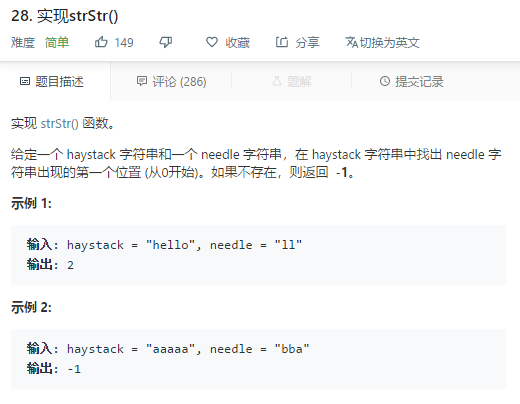leetcood学习笔记-28-KMP*
题目:

第一次提交:
class Solution: def strStr(self, haystack: str, needle: str) -> int: if not len(needle): return 0 for i in range(len(haystack)): if i+len(needle)<=len(haystack): if haystack[i:(i+len(needle))]==needle: return i return -1
方法二: Sunday 平均O(N),最坏O(MN)
class Solution: def strStr(self, haystack: str, needle: str) -> int: if not needle:return 0 from collections import defaultdict dic = defaultdict(int) for i,v in enumerate(needle): dic[v] = len(needle) - i idx = 0 while idx + len(needle) <= len(haystack): cur = haystack[idx:idx+len(needle)] if cur == needle: return idx else: if idx+len(needle) >= len(haystack): return -1 cur_c = haystack[idx+len(needle)] if dic.get(cur_c): idx += dic[cur_c] else: idx += len(needle)+1 return -1
方法三:kmp O(m + n)
class Solution: def strStr(self, t, p): """ :type haystack: str :type needle: str :rtype: int """ if not p : return 0 _next = [0] * len(p) def getNext(p, _next): _next[0] = -1 i = 0 j = -1 while i < len(p) - 1: if j == -1 or p[i] == p[j]: i += 1 j += 1 _next[i] = j else: j = _next[j] getNext(p, _next) i = 0 j = 0 while i < len(t) and j < len(p): if j == -1 or t[i] == p[j]: i += 1 j += 1 else: j = _next[j] if j == len(p): return i - j return -1
next数组的优化:
class Solution: def strStr(self, haystack: str, needle: str) -> int: if not needle:return 0 def getNext(s): next_ = [0] * len(s) next_[0] = -1 i = 0 j = -1 while i < len(s) - 1: if j == -1 or s[i] == s[j]: j += 1 i += 1 if s[i] == s[j]: next_[i] = next_[j] else: next_[i] = j else: j = next_[j] return next_ next_ = getNext(needle) i,j = 0,0 while i < len(haystack) and j < len(needle): if j == -1 or haystack[i] == needle[j]: i += 1 j += 1 else: j = next_[j] if j == len(needle): return i - j return -1
注意:
说明:
当 needle 是空字符串时,我们应当返回什么值呢?这是一个在面试中很好的问题。
对于本题而言,当 needle 是空字符串时我们应当返回 0 。这与C语言的 strstr() 以及 Java的 indexOf() 定义相符。
方法二:KMP算法,KMP的整体时间复杂度为O(m + n)。
算法详解:https://blog.csdn.net/v_july_v/article/details/7041827


 浙公网安备 33010602011771号
浙公网安备 33010602011771号